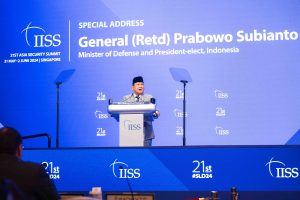Indonesia’s president-elect has expressed his desire for a “comprehensive and permanent ceasefire” in the Israel-Hamas war, adding that his country is willing to send peacekeeping troops to enforce a ceasefire in Gaza if requested.
Speaking on Saturday at the Shangri-La Dialogue in Singapore, Asia’s premier security conference, Prabowo Subianto said that U.S. President Joe Biden’s recent proposal for a ceasefire in Gaza was a “step in the right direction,” and that Indonesia would “do whatever we can to provide humanitarian assistance.”
“When needed and when requested by the U.N., we are prepared to contribute significant peacekeeping forces to maintain and monitor this prospective ceasefire as well as providing protection and security to all parties and to all sides,” Prabowo said, according to a Reuters report. He added that Indonesia was also “very willing to evacuate and treat wounded Palestinian civilians and those needing hospital care in Indonesian hospitals.”
During his speech, Prabowo, who takes over as president in October, also called for a comprehensive investigation into the “tragic events” in the Rafah area of southern Gaza, the location of an ongoing Israeli offensive, and repeated Jakarta’s call for a “just solution” to the situation in the occupied Palestinian territories.
“The only real solution to lasting peace and security for both Israel and Palestine is a two-state solution,” he said, according to the South China Morning Post. He added later, “And that means the rights of not only Israel to exist, but also the rights of the Palestinian people to have their own homeland, their own state, living in peace.”
On the sidelines of the Dialogue, Prabowo also met with Defense Secretary Austin and with Ukrainian President Volodymyr Zelenskyy, among other leaders.
Prabowo’s comments are unsurprising, given that Indonesia is a long-time critic of Israel and the political imperative for any Indonesian leader to be seen as supportive of the Palestinian cause. For this reason it has refused to establish diplomatic relations with Israel and has been outspoken in criticizing the Israeli response to the attacks by the militant group Hamas on October 7 of last year.
Also on Saturday, President Joko “Jokowi” Widodo called on Israel to obey the International Court of Justice, which last month demanded that it to halt its offensive in Rafah. “Israel should have an obligation to obey international courts, including stopping offensive attacks against Palestine,” Jokowi told reporters. In November, in a meeting with Biden, Jokowi said that the U.S. should “do more to stop the atrocities in Gaza” and that a ceasefire “is a must for the sake of humanity.”
Prabowo’s comments came nested inside a speech in which he reiterated Indonesia’s non-aligned foreign policy stance and, amid dueling Shangri-La speeches from top Chinese and American defense officials, called for Beijing and Washington to exercise restraint.
“Once again, we call upon the leaders of the great Chinese civilization, as well as the leaders of the United States and its Western allies, to rise to their great responsibilities in their leadership role as global powers,” he said. “We are convinced that the leaders of the great powers can coexist with each other and cooperate and collaborate in the pursuit of the common good of humanity.” This contained more than an echo of former Singaporean Prime Minister Lee Hsien Loong’s keynote speech from the 2019 Shangri-La Dialogue, in which he called on both the U.S. to make mutual accommodations in order to avoid conflict.
Curiously, Prabowo also made mention of the so-called “Asian way” of dealing with conflicts, referencing his country’s past tensions with Singapore and Malaysia. “Real security comes through very good relations between our immediate neighbours. This is part of our Asian culture. We must be close, friendly with our immediate neighbours,” he said.
“But now, we are the best of friends,” Prabowo added. “We resolved our differences without interference from any external power.”
Whether Prabowo’s mention of the “Asian way” and outside “interference” was a veiled criticism of the involvement of “outside forces” in the region’s disputes, as Chinese Defense Minister Deng Jun put it in talks with U.S. Defense Secretary Lloyd Austin on the sidelines in Singapore, or whether it was an anodyne reference to the use of dialogue to resolve disputes, is hard to parse.
But Prabowo’s speech, his third consecutive annual address to the Shangri-La Dialogue, suggests a desire to play a more constructive role in the resolution of the current conflict in Gaza, rather than simply lobbing criticisms from the sidelines. It also suggests that Prabowo intends to play a more active role on the global stage than has Jokowi, who has generally viewed foreign policy as an adjunct of his domestic economic agenda.

































